Text
Krollin' With My Homies
BY CARMEL LOBELLO • IMAGE BY KEVIN ZACHER
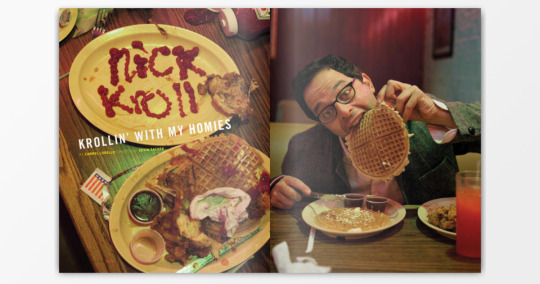
“You know who likes fried chicken? Black people. You know who else likes fried chicken? Everybody.”
Nick Kroll has been doing the fried chicken joke for a while, and wherever he is, whether he’s on Live at Gotham, performing on Jimmy Kimmel or on his home turf at Upright Citizen’s Brigade in Los Angeles, everyone in the room laughs. He has a sharp yet friendly way of delivering it—like he’s doing a bit with you rather than telling a one-sided joke. “I love doing stand up,” he says. “I love that you can grab a microphone and go anywhere in the country and talk to a group of people and make them laugh. And you don’t need props, you don’t need wigs, you don’t need anyone explaining anything. Everyone understands it. Sometimes they’re not gonna like you—but you know, I like that.”
Upright Citizen’s Brigade is a homebase for Kroll, a foundation to keep the emerging talent anchored as he spins his career through enough media channels to make your head spin. First there was the Internet—his shorts like “The Ed Hardy Boys” and his audition tape as Bobby Bottle Service for The Jersey Shore were some of the most-watched pieces of comedy online this year. Then there’s television, with HBO’s Life and Times of Tim and FX’s The League. Most recently he’s clawed his way onto the big screen with roles in four movies releasing this year.
If Nick Kroll were an outfit, he’d be described as “high-low.” If your shirt is from Target and it looks good enough to wear with your Chanel bag, then not only is it a damn good shirt, it’s also available to everyone. Being high-low is having range.
“I came up at UCB and this place called Rafifi’s in New York and Largo, and it’s a very specific audience that goes to these shows,” he explains. “It’s college educated, upper-middle class white people in their twenties and thirties.” The difference between Nick and most of the comics who come up in that scene, even the really good ones, is that most of them stay there. Being part of this hyper-intellectual community is both exciting and essential for Nick, but he has his eye on a much broader fan base.
“TThe people who I respect a lot like Louis CK, Chris Rock or Seinfeld—these guys can go and make anyone laugh. It doesn’t matter if it’s super blue collar or super rich, or whatever. They’re just funny. There are certain universal truths that everyone can understand, and I think that’s what I aspire to.” On the other hand, he’s careful to qualify, “If I only can make certain people laugh then so be it—I don’t want to tell jokes that I don’t think are funny to get a broader audience.:
At the high end of Nick’s “high-low” continuum are the characters he invents for his bits at UCB. “The UCB audience has a very specific point of view on the world,” Nick admits. “It’s very ironic.” Fabrice Fabrice, who was his first character to catch on with live audiences, is the vicious gay craft service guy on the set of That’s So Raven. He struts on to the stage at the start of every show in a pink polo belly-shirt, pink flip-down Uggs, and two pairs of sunglasses. Another UCB favorite is Gil Faison, an Upper West side [sic] divorcee with an affected accent, an affinity for Allan Alda [sic], and possibly a coke problem. In a skit at UCB in New York, Nick and John Mulaney gave a walking tour of the city in ribbed turtlenecks, blazers, and gray wigs. In front of a picture of Central Park Nick points to an imaginary passer-by and says, “Oh look at that, it’s a brown woman walking around with her white babies,” to which John responds, “Oh that is a genetic mystery.” “We applaud it,” says Nick. They then take the audience to “The hot cultural center, Times Squaaaaare”, where John comments, “You know the problem with an anonymous jerk-off booth, is that you still know who you are.” The audience laughs at every joke. They’re New Yorkers, so they get it.
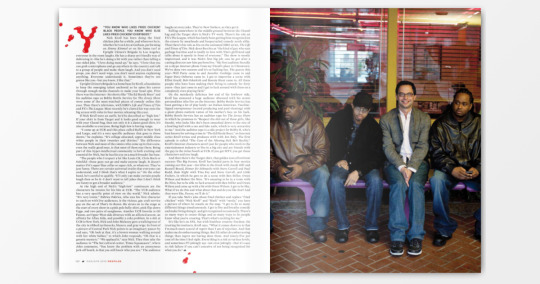
Falling somewhere in the middle ground between the Chanel bag and the Target shirt is Nick’s TV work. There’s his role on FX’s The League, which has lately been getting him recognized on the streets by meatheads and bespectacled comedy nerds alike. Then there’s his role as Stu on the animated HBO series, The Life and Times of Tim. Nick describes Stu as “the kind of guy who eats garbage burritos and is totally in love with Tim’s girlfriend and talks about it openly in front of everyone.” The show is mostly improvised, and it was Nick’s first big job—one he got after a casting director saw him perform live. “My first audition literally on a skype [sic] internet phone from my friend’s place in Chinatown. We’ve done two seasons and it’s so fucking fun. The guests this year—Will Forte came in and Jennifer Coolidge came in and Super Dave Osborne came in. I got to improvise a scene with Elliot Gould. [sic] Bob Odenkirk and Bonnie Hunt came in. All these people who have been making their living in comedy for forty years—they just come in and I get to fuck around with them on a completely even playing field.”
On the mordantly delicious low end of his lowbrow side, Kroll has ensnared a huge audience obsessed with his newer personalities who live on the Internet. Bobby Bottle Service has been getting a lot of play lately—an Italian-American, Vaseline-lipped entrepreneur (record producing and pool cleaning) with a giant photo-realistic tattoo of his mother’s face on his back, Bobby Bottle Service has an audition tape for The Jersey Shore in which he promises to “Respect the shit out of those girls, like Snooki, who looks like she’s been smooshed down to the size of a bowling ball with a tan an fake nails, which is very attractive to me.” And the audition tape is a side project for Bobby B, who’s best known for solving crime in “The Ed Hardy Boyz,” an internet series Kroll writes and produces with with [sic] Jon Daly. The first episode is called “The Case of the Missing Sick Belt Buckle.” Kroll’s Internet characters aren’t just for people who work in the entertainment industry or live in a big city and are friends with the guy in the ticket booth at UCB. If you get MTV, you get these characters and you laugh.
And then there’s the Target shirt, that golden icon of low brow [sic] success. The Big Screen. Kroll has landed parts in four movies coming out this year—Get Him to the Greek with Jonah Hill and Russell Brand, Dinner for Schmucks with Steve Carrell [sic] and and Paul Rudd, Date Night with Tina Fey and Steve Carrell, [sic] and Little Fockers, in which he gets to do a scene with Ben Stiller, Owen Wilson and Robert De Niro. “It’s amazing to be in a scene with De Niro, but to be able to fuck around with Ben Stiller and Owen Wilson and come up with a bit with Owen Wilson. I get to be like, What if we do this and what about that and do you like that? And they were like, Funny, we’ll do it.”
If you take Nick’s joke about fried chicken and replace “fried chicken” with “Nick Kroll” and “black” with “nerdy,” you have a picture of where he stands on the map. “I get to do so many different things simultaneously. I get to live and breathe comedy and make living doing it, and get recognized occasionally. There’s so many ways to create things and so many ways to let people know what you’re creating. That’s exciting for me.”
It’s like he’s on SNL, but with limitless creative freedom. On trusting his instincts, Kroll says, “What it comes down to is that I’m much more scared of regret than I am of rejection. And that makes me do embarrassing things. But I’d rather do embarrassing things than regret not having done them. And ninety-five per cent of the time I feel right. Everything is a risk at various levels, and sometimes I’ll jokingly say—not even jokingly—that it’s easy to risk failure if you can’t conceive of not being recognized for what you do.” ⇼
__________
This article appeared in Issue 23 of Death+Taxes, published on April 7, 2010. Death+Taxes (2008-2010) is a defunct music and men’s lifestyle print magazine; it relaunched as a website in 2010 and was eventually acquired by SpinMedia in 2014, where it remains a culture and politics vertical of Spin.
Text and spread screenshot taken from Issuu.
#death+taxes#death+taxes issue 23#death and taxes#April 7 2010#carmel lobello#nick kroll#magazine#archive#digital archives#2010#interview
0 notes
Text
Kids R' all white
The Whitest Kids U’ Know know what’s funny
By Jane Borden
Although stand-up comics focus on perfecting one strong 20-minute set, the key to becoming a respected sketch group—faced with an hour to fill and striving to build a recurring audience—is to never let the joke well run dry. Since last February, The Whitest Kids U’ Know have been prolific, debuting new, inventive material every Sunday night at Pianos on the Lower East Side, while amassing a loyal fan base and a library of more than 200 sketches.
When challenged with generating that many original bits, a group is bound to repeat some premises. “We write a lot about war… and robots,” Trevor Moore, 24, says. The performer is surprisingly subdued for someone who, in one of the group’s short films, is comfortable swinging a bat on a Queens street and screaming to a second-floor window with child-like excitement, “Hey Bill! Come on: Race War!”
The group formed in 2000 when Moore met Sam Brown at an open mike in the city. “I had a pen that I pretended was a rocket ship and I just flew it around on stage for a couple minutes,” he recalls. “I don’t think anybody liked it but Sam.” The two School of Visual Arts students soon hooked up with another, Zach Cregger (strikingly handsome, predictably pursuing an acting career) and the perpetually unclothed-on-stage Timmy Williams, a student at Brooklyn College at the time. Darren Trumeter, 25 and the last to join, went through a rite of passage, as Moore recalls. “At a party, he was talking about getting in the troupe and we said, ‘Punch Zach in the face.’ So he goes over, taps Zach on the shoulder and punches him. We were like, ‘Yeah, you should be in.’”
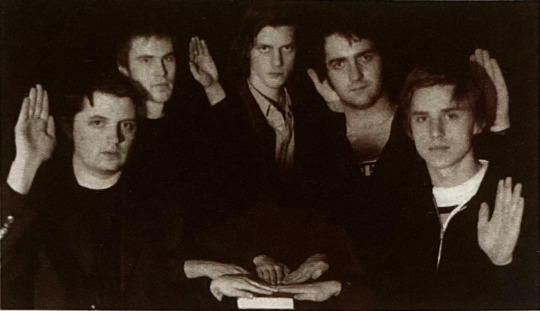
…AND NOTHING BUT THE SPOOF Timmy Williams, Zach Cregger, Trevor Moore, Sam Brown and Darren Trumeter, from left, in black and mostly white.
After WKUK had done stints on stages at SVA and in comedy clubs around town, Pianos’ owners approached them to fill the bar’s Sunday night spot. “The crowd we try to appeal to isn’t the kind who pay $25 and a drink minimum,” Cregger, 25, says. They are, however, the kind who linger, hanging out with one another and the troupe, and return week after week.
The back-room attitude of Pianos also allows the troupe to take risks. Before launching into an impossibly high-pitched, a cappella duet sparked by news of Spielberg’s new Tom Cruise vessel The War of the Worlds, Moore announces, “Sam and I wrote this an hour ago.” It was awkward, nonsensical, childish and the funniest part of the show.
In fact, their scenes work precisely because they’re so bizarre. WKUK doesn’t remind you of anything else: They’ve had no formal training, rarely see other sketch shows and don’t even name comedic influences. When Brown, 23, attempts to explain the inspiration behind “War of the Worlds,” he says, “Trevor was listening to ‘Godzilla’ by Blue Öyster Cult…” Then Moore finishes his sentence, “So I guess Blue Öyster Cult is one of our main influences.”
Of course, not every risk returns a reward. But even the scenes that last too long or wax too wordy have something interesting or funny at heart. Their writing always puts the joke front and center. They don’t use props and always play themselves. “We’re not good enough to remember different names,” Moore jokes. “We try not to do sketch sketch… where everyone comes out in matching suits and stuff.”
They just do a lot of sketch. “Even though we write so much about pirates,” Cregger admits, “we try to do each scene in a new way. There’s one where there are a bunch of pirates in the crowd being loud and Trevor is shushing them—the whole sketch is just him saying, ‘Pirates! Pirates, quiet!’” Moore interrupts with sarcasm, “But then we’ll write another one where we’re pirates attacking robots on the sun—so that’s different.”
Hopefully their off-center humor will reach a larger audience soon. The group’s television-pilot teaser is in the pitching process with a few networks. Seeing a fresh perspective like theirs on the air would be a triumph for any comedy fan, but especially for those who agree with their opinions on most TV routines. “Putting a celebrity in a wacky situation bores the shit out of me,” Cregger says. Moore adds, “And if I see one more scene about a gay priest…”
“We do plenty of gay jokes,” Cregger admits, “but at least we have a new angle on it.” “Right. Our gay robot sketch is hilarious,” Moore jokes. “Oh yeah—that’s the one with the pirates in it,” Brown shoots back.
__________
This article first appeared in Issue 493 of Time Out New York, an entertainment and events guide magazine. Whitest Kids U’ Know cofounder Trevor Moore credited the piece with boosting the sketch troupe’s popularity; following the article’s publication in March of 2005, “you couldn’t get into our shows,” he said. Time Out New York released its final print edition in 2020 and is now available exclusively online.
Text and image taken from Reddit.
#the whitest kids u know#whitest kids u know#wkuk#time out#time out new york#march 10-16 2005#time out New York issue 493#Jane borden#magazine#archive#digital archives#trevor moore#zach cregger#sam brown#Timmy williams#darren trumeter#2005#interview
7 notes
·
View notes
Text
Home Theater, Recession Style
Big Screen, Little Wallet
BY ZAC NADILE • IMAGE BY JOEY PARLETT
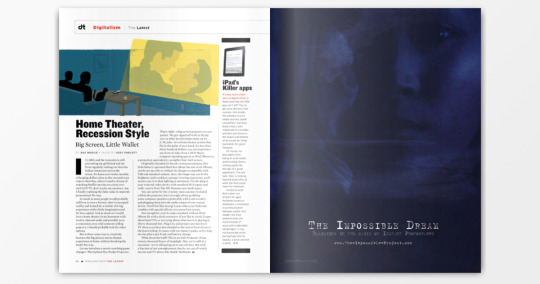
It’s 2010, and the recession is still preventing my girlfriend and me from regularly visiting our favorite Italian restaurant across the street. It’s been over twelve months of keeping dollars close to the vest and even trips to Best Buy, where I used to dream of watching Netflix movies on a sixty-two-inch LCD TV, don’t excite me anymore. Am I finally realizing the false value in material possessions? No way.
As much as most people would probably still love to own a Ferrari, they’ve accepted reality and looked for a similar driving experience with a little imagination and far less capital. And as much as I would love a home theater in my basement with twelve-channel audio and possibly even a concession area with someone selling popcorn, I should probably look for other options.
But is there some way to creatively harness the big-picture movie theater experience at home without breaking the bank? Yes way.
Let me introduce a movie watching game changer: The Optima [sic] Pico Pocket Projector. That’s right—a big-screen projector in your pocket. We got ripped off with no flying cars in 2010, but this helps make up for it. No joke—it’s a home theater system that fits in the palm of your hand. For less than three hundred dollars, you can experience any form of video from a DVD player, computer (pending specs) or iPod/iPhone on a projection equivalent to an eighty-four-inch screen.
Originally intended for board-room presentations, this little battery-operated black box (about the size of an iPhone) can be set up with or without its charger (compatible with USB and standard outlets). Sure, the image may not be the brightest, and to achieve a proper viewing experience you’ll need to use it in dark lighting at minimum. Put the plug in your external video device with standard RCA inputs and voilà—you’re livin’ like MC Hammer pre-bankruptcy.
You can settle for the crummy mono speaker included within the projector, but I strongly advise grabbing some computer speakers (preferably with a sub-woofer) and plugging them into the audio output of your source device. You’ll feel like George Lucas when your bedroom rumbles with special effects on a seven-foot screen.
Not enough for you? It comes standard with an iPod/iPhone kit with a dock connector. If you like to travel, forget about hotel TVs or worrying about what movie is playing at thirty thousand feet. Plug it in, and project any movies or TV shows you have downloaded to the seat in front of you or the hotel ceiling. It comes with two battery packs, so for long movies plan a pee break and battery change.
What about the bulb? This is an LED Projector. It has twenty thousand beams of lamplight. Hey, we’re still in a recession—we’re still going out to eat a lot less. But with a fraction of our unemployment checks, we can all watch movies and TV shows like Daddy Warbucks. ⇼
__________
This article appeared in Issue 23 of Death+Taxes, published on April 7, 2010. Death+Taxes (2008-2010) is a defunct music and men’s lifestyle print magazine; it relaunched as a website in 2010 and was eventually acquired by SpinMedia in 2014, where it remains a culture and politics vertical of Spin.
Text and spread screenshot taken from Issuu.
#death+taxes#death and taxes#death+taxes issue 23#April 7 2010#archive#magazine#digital archives#zac nadile#optima pico projector#home projector#optoma pico projector#home theater#recession#2008 recession#2010
2 notes
·
View notes
Text
In the Morning
By Enda Walsh
They were once made, of course, these wooden blinds. Once brand new. Wrapped daintily, probably, and bought as part of a bigger dream, by a young couple, maybe, who made a longish car journey to the outskirts of the city, to a warehouse housing various homewares. And the wooden blinds, so carefully placed in the boot of the car, and removed and carried up to this… I think it must be a flat, I’m not too sure yet, but… but the wooden blinds, with care still, are attached to the window, and she and he must’ve sat on the sofa, a sofa I’m aware of but have not looked at yet, for I know what’s lying there. But they sat on the sofa, drinking tea and eating into a packet of biscuits, and stared up at these wooden blinds, and what they felt in their stomachs beneath the sugary mush of tea mixed with biscuits, what they must have felt was… pleasure. Not pleasure - success.
They have lost their luster, these blinds, not completely, but a few summers have baked them dull. Even from where I’m lying I can see it, or maybe just guess it, that from the outside they are graying, like I am. They are tired, like I have been. They have been ignored, like everything else. I try again to think of the faces of the couple who bought these blinds, who owned this flat, for now I’m sure it’s a flat, but I can’t see their faces when I shut my eyes. In the darkness I try to construct what they looked like again and so drag together eyes and noses with no definition, hair that moves like a cloud on a changeable head. I make some composite of a man and a woman whose features bleed back into black.
I send my eyes back open, back onto the wooden blinds. My stomach sours for a moment, not from anything eaten - I don’t eat, I know that much. But lying on the floor is a… cream-colored carpet? I can see that now. And lying here on this carpet I can feel my stomach share the sourness with the rest of me, with my hand certainly. What have I done? it speaks. But it knows. It talks through the wooden blinds. Unspoken it calls to me to sit up, to walk around the flat, to uncover what it was, to uncover what happened here, to look at the sofa. I can’t. I won’t. Because I know, of course…
I have blood on my hands. I won’t look at them. I can feel the blood there, and there is a lot of blood. My fingers, the skin stretched, there must be much blood, I guess, and dry now, they curl over the cuff of my shirt. It’s wet still, the cuff. And I’m aware of my clothes and how they’re on me, lying on me all crumpled, everything else dry at least, but for the wet cuffs, the cuffs and my eyes… they seem to be crying. But not just yet, but… I feel like I should be. And the eyes are asking me to think about what happened last night, for it’s morning time and I’ve woken like this before, in another room. Other rooms.
The sourness turns, and images I can see of me as a shadow and having found my way into the room I shouldn’t be in, I sit watching television. Sometimes I make myself a cup of coffee, depending on the type of coffee that the family buy, and always I sit and wait. And it seems wrong to open the drawers for wardrobes, to enter bedrooms, even, seems disgusting and intrusive, definitely, and wrong too to steal that coffee, to use their electricity to watch whatever’s on, but I do. Why shouldn’t I? I sit, and I’ve sat often on sofas, and it is the most still I feel. With nothing on my mind the world is frozen and silent, and only the silent moving images of daytime television brightly hitting my eyes but not my mind. The mind is untouched still, yet turning, imperceptibly.
To sit in another person’s life, to sit surrounded by their things, a world that’s invisible to them now. A place grown dull and beneath normal, a room ignored as this room was before I sat here and made it something special. To sleep through life, to forget so easily the wonder and effort of how your life is pulled around you and how it stays. When all outside is sliding and crashing about, to forget with easy indifference the home that you made, the room that you made to keep you safe, to forget all of this?
How many times have I sat on other people’s sofas and waited to kill them? Many. A reckoning I’ll bring, a reckoning to the spoiled, to the forgetful. From the carpet I look up and see them on the sofa. They’re still. I can hear their souls wailing outside and calling me out of this room, out of this flat, back onto the streets. My rest is over. It’s morning time, and time to move on.
__________
"In the Morning" is a spoken word short story written by Irish playwright and screenwriter Enda Walsh. Originally narrated by actor Cillian Murphy, the story first appeared as the epilogue to the 2015 mixtape Late Night Tales: Nils Frahm.
#in the morning#short story#enda walsh#cillian murphy#spoken word#late night tales#late night tales: nils frahm#September 11 2015#2015
37 notes
·
View notes
Text
TREVOR MOORE
The Whitest Kid You Know
As ringleader of The Whitest Kids U’ Know, Trevor Moore spent the last two years working a deliciously twisted flavor of humor into the palate of American comedy. When Hollywood handed him the keys to the big-screen machine this spring, he churned out Miss March—one of the most aggressively bizarre comedies in years. DJ Pangburn visited Los Angeles’s Griffith Observatory with Moore to explore otherworldly phenomena and seek out where the jokes come from.
By DJ Pangburn • Photos by Ray Lego • Styling by Carmel Lobello & Jill Breare
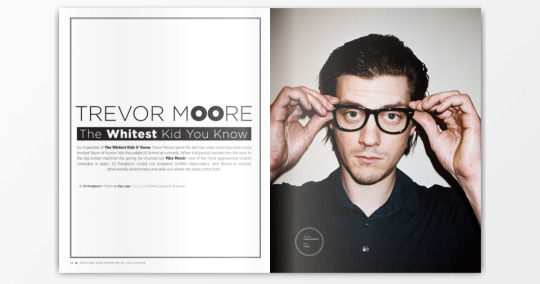
Trevor Moore and I are to meet at the Griffith Observatory in the evening. That’s what I’ve been told. As I walk towards the entrance, I notice a sticker on a sign that reads “Captain Gaylord.” In a place of public science, a bust of James Dean lords over the place. After all, this is Hollywood, and no public place would be complete without Dean’s brooding presence. The smog of Los Angeles is like a rainforest, and I wonder if it’s possible to observe anything in this sky. Pluto is no longer a planet, but the observatory is disregarding this astronomical ruling. Pluto still orbits the Sun out on the front lawn. Griffith J. Griffith was something of a madman, and the land he bequeathed to Los Angeles today still seems to suffer some otherworldly spell.
Trevor arrives wearing a Harley-Davidson jacket. But, as he will tell you, he does not have a bike and this confuses everyone he meets. After determining how much we weigh on each of the planets, we talk briefly about the masterpiece of nonsense that is Pootie Tang, which leads us straight down the absurdist trail to Freddie Got Fingered…
How do such movies make it through the Hollywood machine? Freddie Got Fingered is one of the most amazing feats ever!
[Tom Green] just had complete creative control over the thing. I enjoy watching it. But Pootie Tang—I remember I rented that in college and I watched it and thought, I don’t like that. But then I kept thinking about it the next day and telling people about it. So I watched it again, and it was a completely different movie. The second time I watched I was like, I love this movie.
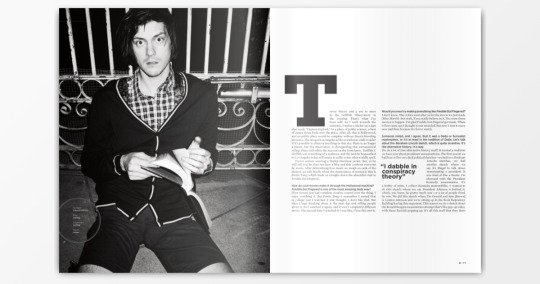
Would you ever try making something like Freddie Got Fingered?
I don’t know. The critics were after us for the movie we just made [Miss March]—but yeah, if you really believe in it. You want those movies to happen. I’m glad Freddie Got Fingered got made. When it first came out I thought it was retarded. But now I rent it every now and then because it’s fun to watch.
“I dabble in conspiracy theory”
Someone noted, and I agree, that it was a Dada or Surrealist masterpiece, or it’s at least in the tradition of Dada. Let’s talk about the Abraham Lincoln sketch, which is quite inventive. It’s like alternate history, in a way.
We do a lot of that alternate history stuff. It started a tradition we have now about presidents’ assassinations. The first season we had four or five very dark political sketches—we had two Abraham Lincoln sketches, we had another sketch where we say it’s illegal to talk about assassinating a president. It was kind of like a theme. I’m obsessed with the President Kennedy assassination. It’s a hobby of mine. I collect Kennedy memorabilia. I wanted to do this sketch where we say President Johnson is behind it, which, you know, he pretty much was—or a lot of people think he was. We did this sketch where I’m Oswald and Sam [Brown] is Lyndon Johnson and we’re sitting up in the Book Depository Building having this argument. This season we do a sketch about the Ronald Reagan assassination attempt that’s like pop-up video, with those factoids popping up. It’s all this stuff that they don’t talk about. Reagan did some good things, but he’s canonized now—as soon as he died he became this saint and historical figure. He did some good things but he also armed everybody that we’re fighting now. He got us in Rwanda.
“I’m obsessed with the President Kennedy assassination. It’s a hobby of mine.”
He armed the Contras.
He ignored AIDS for a decade and let it become a full-blown epidemic. So during this Reagan sketch, all these effects pop up with these odd facts—like, let’s slow our roll on this patron saint that is Ronald Reagan. But we’re kind of out of people now. [Laughs]
Were there any repercussions to the “It’s Illegal to Talk About Assassinating the President” sketch?
No. I checked it with my lawyer and he didn’t know. I was a little nervous about it, so I called the ACLU and they wouldn’t tell me if I could say it or not. I ended up asking them, “If I got in trouble for this, would you pick up the case?” They said, “Yeah.” But I still took part of it out. I don’t think I would have thought that sketch was as interesting or funny now. Most of the people my age that grew up during the Bush years hated him. He was our Nixon. If I came up with an idea like that during the Obama administration, I would be like, Eh, no, I don’t want to. And it’s not like you can’t make jokes with Obama, but he’s a different guy and there are different connotations.
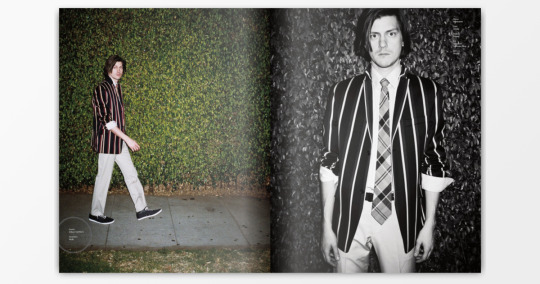
At this point a most horrific cacophony of dog cries erupts from the hills below. Trevor looks in the direction from which the noise is coming and says, “What is that?” I say, “Holy shit… it could be a cougar, or a snake.” Trevor jumps down from the ledge on which he had perched himself and states unequivocally, “We’ve gotta go look at this.” I’m not quite sure how he intends to get us down to the crying dogs, but I play along, “You really want to go down there?” Trevor nods, “We gotta go down there.” We descend the steps of the observatory and toward the melee down slope. “It’s like flying dogs in a bat swarm,” Trevor says of the noise, and I try to make sense of what flying dogs in a bat swarm might look like. We encounter a couple Armenians smoking cigarettes and Trevor asks their opinion on the matter. One replies, “Wolves.” they smile at us and then look back out to the horizon, smoking ravenously. It’s fairly clear we aren’t going to make any headway into the crying dog matter. So we continue with our interview.
What books or films were influential to your comedic style?
All the Kings Men was always a book I really liked. It’s about backroom politics and how everyone is corrupt. And about how good people who go into politics with the best intentions ultimately become what they hate. But my big influence was always Monty Python. I grew up in a very conservative house and I wasn’t allowed to watch Smurfs, because it had witchcraft and magic in it. I was able to watch Letterman, who was my other big influence. I’d set the VCR, when I was a little kid, to tape Letterman after Carson and I’d watch it when I got home from school the next day. Also, Weird Al. I think he was one of the first people where I realized that he’s a musician, but all he does are funny songs. Lord of the Flies, too. One of the few books I’ve read more than once. In high school I was really into Hunter Thompson. The book I really liked was called Better Than Sex, which really wasn’t one of his better books. It was about the 1992 election. It’s basically about him sitting in his apartment, watching all these different televisions and filing off faxes to people, telling them what they should do. All these people you’d see on TV, he would write a fax to them because he had everybody’s numbers. And because it’s Hunter S. Thompson, everybody writes him back. A lot of the book is just basically him sending off angry faxes to people and then responding.
When Nixon left office, Hunter S. Thompson no longer had the anti-human to attack. We no longer have Bush. For the comedian, how does that affect the work? I know there is never a loss for material, but when the politics have changed—
—Well I don’t think the politics change that much. All the guys behind the scenes are still there.
But when the face of it all isn’t so abrasive and devilish…
That’s when you’re really in trouble. [Laughs] The optimist in me wants to believe it’s different. [The Whitest Kids U Know] performed at benefits to send money to Obama. I was in Grant Park election night. I flew down to the inauguration and I was on the lawn. I was swept up in it, you know. At the same time, I still think it’s the same guys smoking cigars behind the scenes. It’s still the Bilderbergers. It’s still the World Bank.
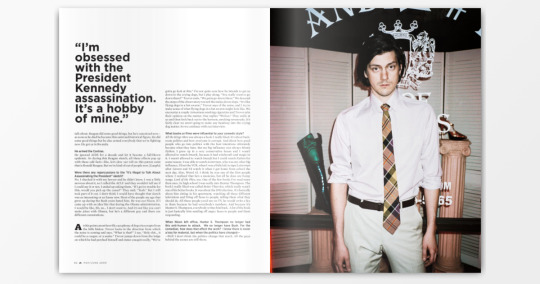
I read this book called Rule by Secrecy by Jim Marrs. And that’s where I was introduced to all those groups and theories, which came out by way of The Da Vinci Code. Ultimately, it led to aliens.
[Laughs] It usually does. I dabble in conspiracy theory. There’s a lot of it in our show because I’m very interested in it. I don’t believe all of it. But I think there’s truth in a lot of it. The problem with it is that the baby gets thrown out with the bathwater a lot. The CIA killed Kennedy. For me, all the evidence is there, or at least the reason for them to do it is there. The witnesses that died—you watch the Zapruder film, he didn’t get shot from the back. He got hit in the front!
Here’s a fact I can’t reconcile with anything: Oswald goes over to the Soviet Union… and he gets back into the United States? No way. How was he not thrown in a prison the minute he stepped foot on American soil?
Yeah—during the Red Scare. I don’t think that these people who are CIA are eventually not CIA. “Oswald was CIA a while ago, but not when he did that!” [Laughs] “Bin Laden was CIA a while back, but not when he did that!”
And you can’t prove anything because it’s the CIA, they can deny anything.
Yes! It’s the CIA! [Whispers covertly] That’s why we have to talk about this in wide-open spaces like this where there’s no microphone.
I tell him about a book called The Men Who Stare at Goats, which details New Age techniques adopted by highly placed U.S. Army intelligence officials in the seventies and early eighties. Officials who believed they could walk through walls, stare goats to death, achieve Jedi-like mental powers, astral project and remote view, amongst other select things. Moore mentions that he himself has tried to astral project.
Explain how you were going about astral projecting.
I used to work for an Asian television network and I was in charge of documentaries. I had this guy who was very into New Age and kind of out there. He talked about how he astral projected all the time, and he had crystals that protected him from the spirits that tried to get him. I was kind of into it for a while and trying to do it. It never really worked. It got to the point where I also talked to people who said they had done it, and some of the stories I kind of believed. I don’t know if I believe it now, but at the time it scared me a bit. The guy I co-wrote with for years was the voice for those commercials that would go, “SEGA!” And he swears he used to do it. But he went the wrong way and bad stuff happened. I’m not sure I want to go and mess around in that world.
You might not make it back! [Laughs]
Right, yeah! I was also doing a documentary-comedy show. I did a pilot for the Asian network. We’d take a topic and make sketches about it, but then also look into it, investigate it. We were doing alien abductions, and we got interviews with people who had been abducted by aliens. These were people abducted by aliens in famous cases. The most absurd alien abduction on American soil—I got an interview with that woman. By the end of that interview I was like, I don’t think alien abductions are real. Then there’s neurolingustic programming…
Which is?
Ever heard of The Game? That book where guys go around hitting on girls?
Yes, the book by Neil Strauss.
That is a lot of neurologistic programming, in those methods. It was a big fad in the seventies. All the books are out of print, though. But it’s a fascinating, weird, almost dark art.
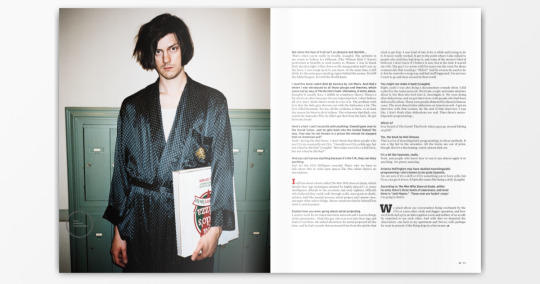
It’s a bit like hypnosis, really.
Yeah, and people who know how to use it can almost apply it to anything. It’s pretty amazing.
Arianna Huffington may have studied neurolinguistic programming—she’s known to be quite hypnotic.
I’m not sure if it’s a skill or if it’s something you’re born with, but if you can get it down, it basically seems like being a Jedi. [Laughs]
According to The Men Who Stare at Goats, within the army there’s three levels of awareness, and level three is “Jedi Master.” These men are fuckin’ crazy!
I’m going to find it.
We joked about our conversation being overheard by the CIA or some other cloak and dagger operation, and how we’d both end up in an interrogation room and neither of us would be surprised to see each other. And with that we departed the observatory—me back to my apartment and Trevor, well, perhaps he went in pursuit of the flying dogs in a bat swarm. ⇼
__________
This article appeared in Issue 19 of Death+Taxes, published on April 8, 2009. Death+Taxes (2008-2010) is a defunct music and men's lifestyle print magazine; it relaunched as a website in 2010 and was eventually acquired by SpinMedia in 2014, where it remains a culture and politics vertical of Spin.
Text and spread screenshots taken from Issuu.
#trevor moore#the whitest kids u know#wkuk#death+taxes#magazine#digital archives#april 8 2009#archive#death and taxes#death and taxes issue 19#2009
13 notes
·
View notes